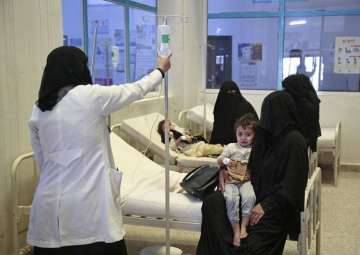UN, aid groups warn of ‘starvation and death’ in war-torn Yemen
The Saudi-led coalition, which is allied with Yemen’s internationally recognized government, has been at war with the rebels since March 2015.

The United Nations and more than 20 aid groups said Thursday that the Saudi-led coalition’s tightening of a blockade on war-torn Yemen could bring millions of people closer to “starvation and death.”
The U.N.’s humanitarian chief warned a day earlier that unless the coalition lifts its blockade, Yemen will face “the largest famine the world has seen for many decades, with millions of victims.”
The coalition closed all ports and halted aid shipments after Yemen’s Houthi rebels fired a ballistic missile over the weekend that was intercepted near Riyadh. Saudi Arabia blamed the strike on Iran, which supports the Houthis but has denied arming them.
The U.S. has also accused Iran of supplying ballistic missiles to the Houthis, charges denied by the rebels, who insist they produced the missile used Saturday on their own.
The coalition, which is allied with Yemen’s internationally recognized government, has been at war with the rebels since March 2015. The Houthis control most of northern Yemen, including the capital, Sanaa.
About two-thirds of Yemen’s population relies on imported supplies, said the aid groups, which include CARE, Save the Children and Islamic Relief. Over 20 million people need humanitarian assistance, including 7 million facing “famine-like” conditions, they said. Food supplies are expected to run out within six weeks while vaccines will last only a month.
They urged an “immediate opening” of all air and seaports.
“If I have to compare Yemen to a person, I would say that this person is very sick, this person is very weakened, and is being drip-fed, so if you want to keep the patient alive, we need to reactivate drip-feeding as soon as possible,” Robert Mardini, the Middle East director for the International Committee of the Red Cross, told The Associated Press.
At the United Nations, spokesman Stephane Dujarric said Thursday marks the fifth day since the Saudi-led coalition imposed a complete blockade on Yemen. He said that since Sunday, the “coalition has not facilitated any humanitarian movements into or out of Yemen carrying relief items and aid workers.”
“Our humanitarian colleagues say that they have heard of health facilities shutting down because they cannot cover the increased fuel costs, and water pumping station have also been affected,” Dujarric said.
The blockade has already led to a fuel crisis in the rebel-held capital, Sanaa, where hundreds of cars lined the roads Wednesday after the Houthis ordered the closure of fuel stations. The rebels said they closed the stations after merchants refused to fix prices. The price of fuel has risen by 50 percent since the coalition tightened the blockade.
Yemeni officials also said those who need to be hospitalized abroad cannot leave the country. They said the Houthis in Sanaa and coalition-backed forces in the southern city of Aden are only interested in treating their own wounded. The officials spoke on condition of anonymity because they were not authorized to discuss the situation with reporters.
U.N. humanitarian chief Mark Lowcock told reporters after briefing the U.N. Security Council behind closed doors Wednesday that there must be an immediate resumption of regular flights to the cities of Aden and Sanaa by the U.N. and its humanitarian partners.
“What we need to see is a reduction of blockages on all sides, not an increase,” he said.
Lowcock also said U.N. Secretary-General Antonio Guterres spoke to Saudi Foreign Minister Adel al-Jubeir on Wednesday morning and “called for an immediate resumption of normal humanitarian access.”
Iran’s Foreign Minister Mohammad Javad Zarif meanwhile said he had proposed a four-point peace plan in 2015 that was still valid.
“In 2015, soon after Saudi coalition initiated war on Yemen, I wrote to the (U.N. secretary general) offering a 4-point peace plan: ceasefire; humanitarian assistance; Intra-Yemeni dialogue; and inclusive government,” he tweeted.
“Over 2.5 years and many lives later, that plan is still valid today.”